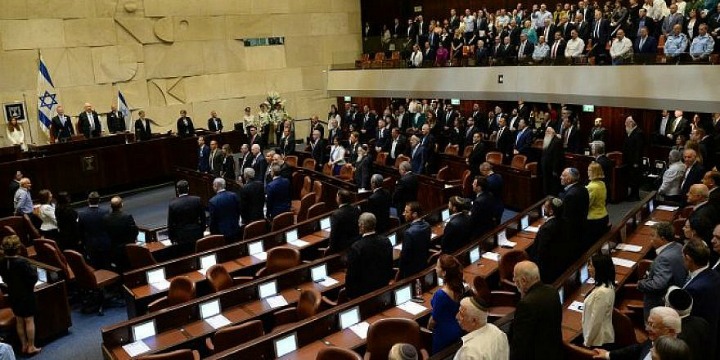Arab Voters Feel More Israeli Than Palestinian
 by Eyal Zisser / Israel Hayom / JNS.org
by Eyal Zisser / Israel Hayom / JNS.org
JNS.org – Arab voters flocked to the polls during last week’s general election in Israel, defying expectations of a low turnout.
Arab turnout skyrocketed compared to the April 9 election, reaching 59 percent — almost as high as the Jewish turnout. This could suggest that the Israeli Arabs are no longer trying to distance themselves from the state’s institutions.
Although Arab voters voted for the Joint List, the only Arab party on the ballot, their high turnout sent a message to the Jewish public. The Arab voters essentially said that they viewed themselves as Israelis and want to take part in the Israeli experience.
Likewise, during the campaign, Arab candidates put aside their solidarity with the Palestinian Authority in its struggle against Israel and scaled back their rhetoric on changing Israel’s Jewish character.
Instead, the Arab politicians campaigned on better education, employment, housing, education, and so forth, highlighting the need to address the festering problems in the Arab sector.
Arab candidates realized that their attempts to drive a wedge between Arabs and Jews, and their refusal to accept Israel as the nation-state of the Jews were turning off voters. Consequently, they figured they could only win back the Arab street if they changed the discourse and promised a course correction.
This reboot is what allowed Joint List leader Ayman Odeh to break from the past: He told Israeli President Reuven Rivlin on Sunday that most of his list was endorsing Blue and White leader Benny Gantz for prime minister.
Considering that Arab parties have almost never endorsed a Zionist Knesset member for prime minister, this move was designed to show his constituents that the Arab parties were not going to engage in the same politics of division as before.
Israel’s Arabs are hungry for full integration, regardless of what transpires in the Israeli-Palestinian conflict. This is why they decided to make their voice heard at the polling booth. In fact, the spike in Arab participation was noticeable a year ago during the municipal elections, when Arab voters sided with candidates who focused on bread-and-butter issues, not anti-Israel rhetoric.
Arab MKs will now have to spend their political capital wisely. This means they must stop their infighting and abandon the anti-Israel agenda they have promoted in past Knessets. Perhaps this transformation will only take place once a new generation of Arab politicians emerges, or only when a new Arab movement comes forward and asks for equality in every aspect — not just in civil rights, but also in civic duties.
But the Jewish public and its leaders face an even greater challenge, and must step up to the plate. The state is now duty-bound to seize this golden opportunity and tap into this Arab thirst for integration.
Eyal Zisser is a lecturer in the Middle East History Department at Tel Aviv University. A version of this article first appeared in Israel Hayom.
 Police Stop Anti-Zionist Agitators From Accessing Florida University President’s Home as Students Revolt Nationwide
Police Stop Anti-Zionist Agitators From Accessing Florida University President’s Home as Students Revolt Nationwide Nearly One in Five Young People Sympathize With Hamas, 29% Say US Should Reduce or End Alliance With Israel: Poll
Nearly One in Five Young People Sympathize With Hamas, 29% Say US Should Reduce or End Alliance With Israel: Poll Ilhan Omar Silent After Daughter’s Arrest, Suspension for Role in Columbia University Anti-Israel Protest
Ilhan Omar Silent After Daughter’s Arrest, Suspension for Role in Columbia University Anti-Israel Protest Cultural Center Backed by Iran’s Revolutionary Guard Plans to Produce Films About Attack on Israel
Cultural Center Backed by Iran’s Revolutionary Guard Plans to Produce Films About Attack on Israel How Does Ilhan Omar Really Feel About Iran?
How Does Ilhan Omar Really Feel About Iran? This Passover, Combine Respect for Tradition with the Courage to Innovate
This Passover, Combine Respect for Tradition with the Courage to Innovate Israel’s Iran Attack Carefully Calibrated After Internal Splits, US Pressure
Israel’s Iran Attack Carefully Calibrated After Internal Splits, US Pressure Palestinian Cameramen Exposed in New Footage Documenting Oct. 7 Atrocities Side by Side with Terrorists
Palestinian Cameramen Exposed in New Footage Documenting Oct. 7 Atrocities Side by Side with Terrorists US Money to Convicted Terrorists; US Training to Aspiring Terrorists
US Money to Convicted Terrorists; US Training to Aspiring Terrorists Man Arrested in Paris After Iran Consulate Incident
Man Arrested in Paris After Iran Consulate Incident




 Amazon Pulls Book by Hamas Leader Yahya Sinwar Referencing Oct. 7 Attacks After UK Lawyers Intervene
Amazon Pulls Book by Hamas Leader Yahya Sinwar Referencing Oct. 7 Attacks After UK Lawyers Intervene Man Arrested in Paris After Iran Consulate Incident
Man Arrested in Paris After Iran Consulate Incident US Money to Convicted Terrorists; US Training to Aspiring Terrorists
US Money to Convicted Terrorists; US Training to Aspiring Terrorists Palestinian Cameramen Exposed in New Footage Documenting Oct. 7 Atrocities Side by Side with Terrorists
Palestinian Cameramen Exposed in New Footage Documenting Oct. 7 Atrocities Side by Side with Terrorists Israel’s Iran Attack Carefully Calibrated After Internal Splits, US Pressure
Israel’s Iran Attack Carefully Calibrated After Internal Splits, US Pressure